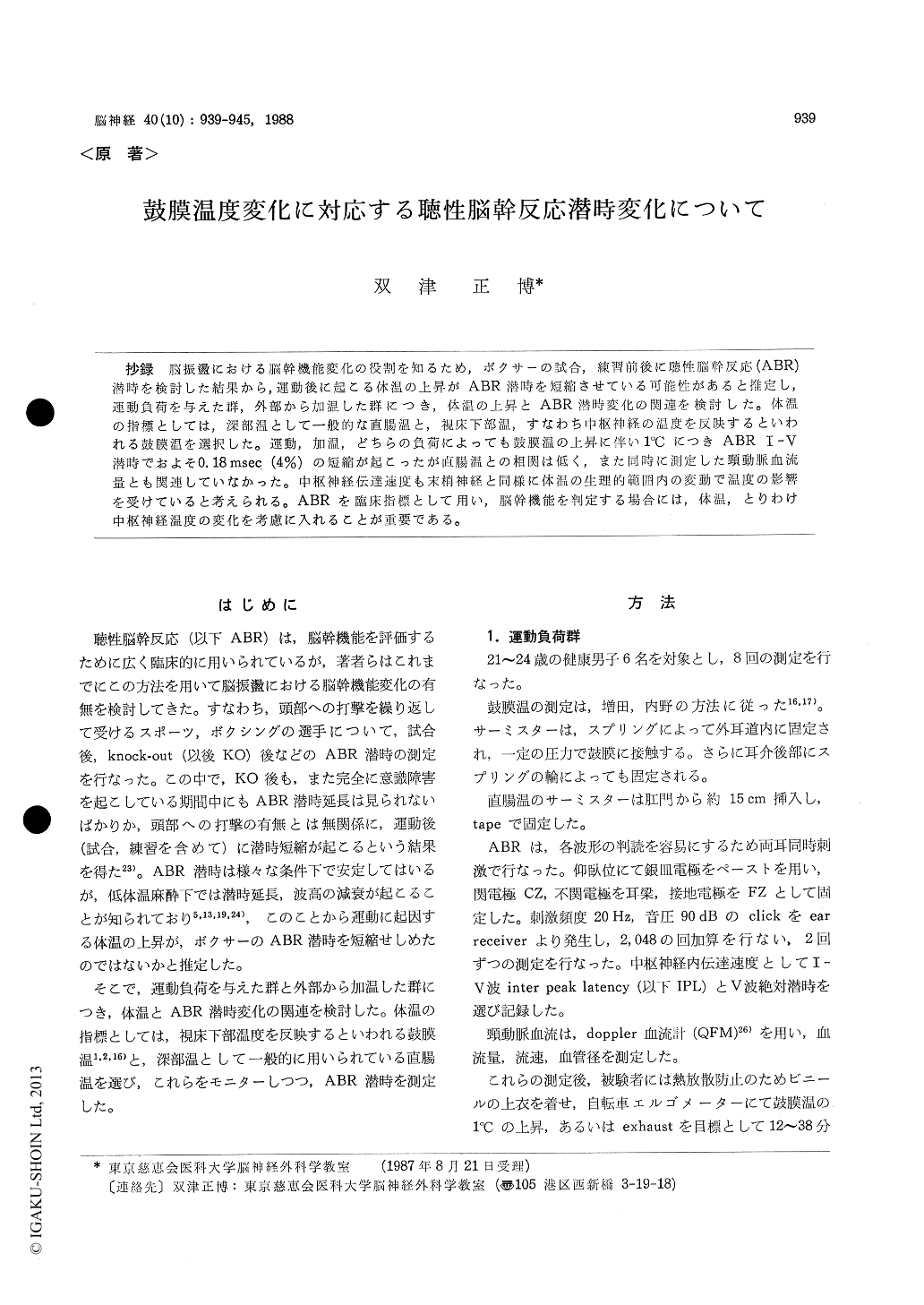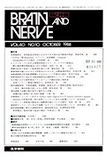Japanese
English
- 有料閲覧
- Abstract 文献概要
- 1ページ目 Look Inside
抄録 脳振盪における脳幹機能変化の役割を知るため,ボクサーの試合,練習前後に聴性脳幹反応(ABR)潜時を検討した結果から,運動後に起こる体温の上昇がABR潜時を短縮させている可能性があると推定し,運動負荷を与えた群,外部から加温した群につき,体温の上昇とABR潜時変化の関連を検討した。体温の指標としては,深部温として一般的な直腸温と,視床下部温,すなわち中枢神経の温度を反映するといわれる鼓膜温を選択した。運動,加温,どちらの負荷によっても鼓膜温の上昇に伴い1℃につきABRI-V潜時でおよそ0.18msec (4%)の短縮が起こったが直腸温との相関は低く,また同時に測定した頸動脈血流量とも関連していなかった。中枢神経伝達速度も末梢神経と同様に体温の生理的範囲内の変動で温度の影響を受けていると考えられる。ABRを臨床指標として用い,脳幹機能を判定する場合には,体温,とりわけ中枢神経温度の変化を考慮に入れることが重要である。
We had examined auditory brainstem responses (ABRs) of boxers in order to study human cerebral concussion. ABRs were not prolonged after bouts or knock-out but were unexpectedly shortened after any exertion with or without impact to the head. It was supposed that hyperthermia induced by exertion shortened brainstem conduction velo-city as it occurred in peripheral nerve.
We investigated correlation of ABR latency and tympanic membrane temperature, which indicated hypothalamic temperature or central nervous tem-perature, during exertion and body heating.
I . Exertion group
Six young males aged from 21 to 24 years old were examined (the two were examined twice).
T ty (tympanic membrane temperature) and T rec (rectal temperature) were monitored. ABRs and carotid blood flow were examined (QFM). Then subjects were covered with PVC clothes andexercised on bicycle ergometer for 12-38 min. After T ty reached apporoximately one degree higher (℃) than base line, ABRs and carotid blood flow were recorded in the course of cooling down. T ty was elevated by 0.82±0.27℃ T rec, 0.60 ±0.26℃ after exertion. ABR I-V IPL was short-ened from 4.24±0.60 to 4.10±0.11 msec (p< 0.01) and it was correlated with T ty change rather than T rec or carotid blood flow. ABR IPL returned to base line as T ty came down.
II. Heating group
Six young males were examined. Hyperthermia was induced by electrical blanket or immersing in hot water (41±1℃).
ABR IPL decreased from 4.2±0.20 msec to 4.04±0.17 msec (p<0.05) correlating with T ty change (0.92±0.10℃ elevation) not to T rec (0.49 ±0.47℃ elevation).
ABRs is a reliable method to evaluate brainstem function because it is not easily affected by anes-thesia or sleep or blood pressure.
The latency increases and the amplitude de-creases during induced hypothermia, as we know. And it is also known peripheral nerve conduction velocity is affected by body temperature.
Our investigation showed the result that central nerve conduction velocity increased by hyperther-mia and decreased by hypothermia, just like peri-pheral nerve, as a physiological reaction. The rate of ABR latency change was 0.18 msec or 4% per degree (℃).
We must keep this fact in mind when we eva-luate brain stem function with ABR.
But when discussing "body temperature", central nervous temperature is important. Oral tempera-ture and rectal temperature do not always indicate central nervous temperature correctly.
So, for the strict evaluation, tympanic membrane temperature or other method which indicates deep cerebral temperature should be chosen.

Copyright © 1988, Igaku-Shoin Ltd. All rights reserved.


